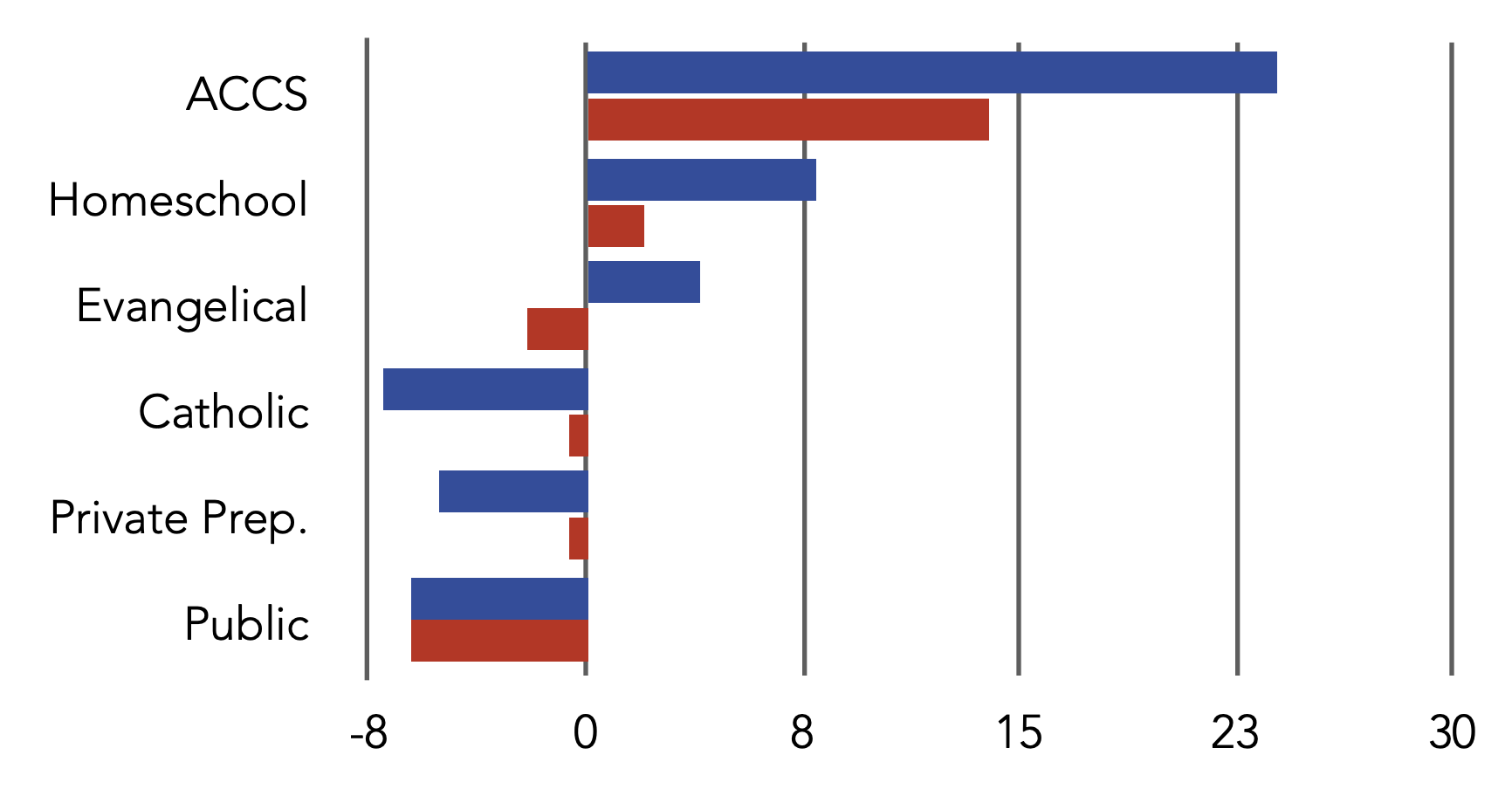Why choose classical Christian education?
The big question: whom is education for?
- Standard education is a canned approach for prepping students for what the job market demands. The central problem to solve is how students can serve the market.
- Classical Christian education has a different goal. We focus on how schools can serve students. The central problem to solve is how to cultivate excellence (both personal and academic).
We assume that children are not just future workers but naturally curious and inquisitive creatures who want to know about, and make sense of, the world around them.
Although classical Christian students consistently rank higher on a number of axes, we are not so much about teaching as we are about forming the soul. We are not so much about subjects as we are about virtue. We are not so much about making a living as we are about living for a higher purpose.
Key characteristics and principles
Classical Christian education is an approach to education that combines classical educational methods with a Christian worldview and values. It draws inspiration from the educational practices of ancient Greece and Rome, as well as the Christian intellectual tradition. These include the cultivation of the 7 Christian virtues, developing student reasoning through the Trivium methodology (Grammar, Logic, and Rhetoric), and interacting with the historical Great Books.
These are the key characteristics of classical Christian education:
- Trivium. Classical Christian education is based on the trivium, which is Latin for “where three roads meet”, a three-stage model of learning that corresponds to the natural stages of a child’s cognitive development.
The trivium consists of:
- the Grammar Stage: in the early years (k-6), students focus on absorbing facts, language, and basic knowledge.
- the Logic (Dialectic) Stage: in middle school, students learn to think more critically and logically, asking questions and making connections between different subjects.
- the Rhetoric Stage: in high school, students develop the ability to express their clear thinking effectively through a masterful command of writing and public speaking.
- Great books. Classical Christian education places a strong emphasis on reading and studying the great works of literature, philosophy, theology, and history. Students are exposed to classical texts and Christian classics that have withstood the test of time.
-
Integration of Faith. A defining characteristic of classical Christian education is the integration of Christian faith and values into every subject and aspect of learning. Students are taught to love whatever is true, good and beautiful, and to appreciate the greatness of God. Biblical standards of conduct are applied in all areas of school life, acknowledging that Jesus Christ is Lord of all.
Students are trained to submit to, internalise, harmonise, align with, and accept God’s truth — not individual, subjective “truths”. This is more than adding a Bible verse to the curriculum. When every facet of History, Science, Math, Philosophy, Art, and other subjects is integrated around the truth of the Christian worldview, students gain a unique and important perspective.
-
Moral and Character Education. Classical Christian education places a significant emphasis on character development, moral education, and virtue. The goal is not only to impart knowledge but also to nurture responsible and virtuous individuals.
- Classical Languages. Classical Christian schools generally teach Latin and Greek, emphasising the importance of these classical languages for understanding the roots of Western culture and thought.
- Critical Thinking. The dialectic (logic) stage of the trivium encourages students to think critically, ask questions, and engage in thoughtful analysis of ideas and arguments. Students work from the greatest literary sources and learn the arts of reasoning, challenging ideas and presenting arguments through dialogue. Teachers often use Socratic questioning techniques to stimulate thoughtful discussion and help students develop their own ideas.
- Cultural Literacy. Classical Christian education seeks to equip students with a broad cultural literacy that includes knowledge of history, art, music, and literature, emphasising their importance in shaping society.
- Classical Pedagogy. Classical Christian education employs traditional teaching methods such as memorisation, recitation, and the study of original source materials.
- Depth Over Breadth. Rather than covering a wide range of topics superficially, classical Christian education often encourages a deeper exploration of key subjects and texts.
- Excellence over conformity. Overall, the classical Christian model educates the whole person, paving the way to a well-lived and satisfying life.

Thankfulness, God’s calling to a vocation, everything (even suffering) is in God’s plan, trust people, self-sufficient, goal-oriented. Alumni from classical Christian schools have positive life outlooks, indicating better life-satisfaction. Source: David Goodwin, Dr David Sikkink, Good Soil, A comparative study of ACCS alumni life outcomes, page 18. Full PDF.
A great method with
great results
Classical Christian schools has been shown to be the best option in the long run on a number of axes, including college and career, outlook on life, independent thinking and so on. The full 56-page study is available in PDF form (2.6 MB).
Free course: is classical Christian education right for your children?
ParentU is a free resource for parents who want to learn more about this educational tradition and its current renewal. Head to https://classicalu.com/courses/parentu-is-classical-education-right-for-your-children/ to access the course (no registration required).
Further reading
Enrol today!
The 2026 enrolment is open for K-12 in several locations around Perth.
WORKING hours
8 AM - 4 PM
Address
Billabong Community Centre
40 Liffey St, Canning Vale WA 6155
Phone
0422 122 545
CCE Perth Inc. is a registered charity with the Australian Charities and Not-for-profits Commission (ACNC)
ABN 81402815769
Coram Deo is a registered member of the Association of Classical Christian Schools (ACCS).
